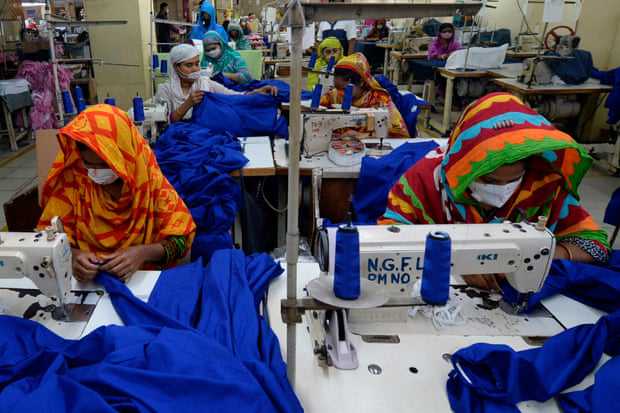Bangladesh garment factories reopen despite coronavirus threat to workers

Collected
Workers in garment factories in Bangladesh, that have reopened despite a nationwide coronavirus lockdown, have said their lives are being jeopardized because they are forced to come back to work in cramped conditions where mask-wearing and physical distancing aren't enforced.
Directives by the Bangladesh government mentioned that garment factories, which supply some of the biggest brands on the globe and produce 84% of the country’s total exports, would be allowed to resume operations, but only when they maintain physical distancing and the ban on public transportation.
However, talking with the Guardian, personnel at garment factories in the commercial areas of Gazipur and Ashulia, on the outskirts of the administrative centre Dhaka, said the only new measure was hand-washing at the entrance, and that no physical distancing measures have been enforced in the factories. Overcrowded buses were bringing them into work. Many said they had been concerned about time for the factories, but had no choice, fearing they might lose their jobs.
One 19-year-old, who irons clothes in a garment factory in Ashulia, said employees had to go on strike to obtain the bare minimum precautionary measures of hand-washing stands and reusable masks.
“We resumed working last Sunday and on the first day, there is no change in the factory,” he said. “I saw in the news headlines that they promised protective gear like masks and social distancing, but our factory didn’t give us anything. We paid for masks from our own pocket,” he said.
“We just wash hands once while entering to the factory, that’s it,” he added, shaking his head in disbelief. “And there’s no social distancing or anything of this sort. Everything is exactly as before.”
A 20-year-old machine operator, Shefaul, said the garment factory owners were trying to “deceive” workers.
“We know things are getting worse,” said Islam. “Folks are falling sick even inside the factories during work hours. However the management tells us that everything is safe and completely in order, which is a blatant lie.” The Guardian could not verify which clothing brands the factory was supplying.
Your choice to reopen the garment factories is a divisive one. Since there is still a relatively low number of coronavirus cases in Bangladesh - about 10,000, with only 187 deaths - the united states has among the lowest testing rates on earth.
Meanwhile the garment industry may be the country’s single biggest revenue generator, worth about $34bn and employing a lot more than 4 million people in 4,500 factories. Nonetheless it has been hit brutally by coronavirus, already losing $3.5bn in cancelled or suspended clothing orders from brands including Topshop, Asda, Urban Outfitters, Sports Direct, New look and Peacocks previously two months.
The dozens of Bangladesh factories supplying Debenhams are in particularly dire straits following the coronavirus downturn sent the department store into administration and struggling to pay for an incredible number of pounds worth of ordered garments now sitting in factories and ports. According to suppliers in Dhaka, the chain has requested an “unaffordable” discount on a number of the goods sitting in ports.
In a statement, Debenhams said: “Like all fashion retailers, we have had to create some very tough decisions in relation to our supply chain. We are trying to deal with those damaged as fairly and openly as possible. As we've said, suppliers who continue to use us during our administration period will be paid to terms.”
The financial brunt of the cancellations and withheld payments has been borne by the workers, with an increase of than 150,000 denied their wages in March. Following the factories at first halted production in mid-March, thousands of workers took to the streets to protest that they were starving.
It was this pressure to revive the garment industry, aswell concerning prevent orders likely to factories in Vietnam or Cambodia instead, that resulted in your choice to reopen the factories by the end of April, with an increase of than 1,000 now back operation.
But Sarwer Hossain, a workers’ rights leader based in the Savar district of Dhaka, said the decision to reopen the factories without enforcing proper safety precautions was putting the lives of thousands of garment workers, their own families and communities in grave danger.
“You can see with your personal eyes how crowded the place is,” said Hossain, gesturing at the bustling roads and marketplace around the factories. “It’s a lot more crammed inside. The majority of the reopened factories didn’t take adequate social distancing or other preventive measures. Only a small number of factories I’ve visited have disinfectant booths and proper temperature checks at gates and provided face shields, gloves and frequent hand washing.”
Ayesha, 24, a machine operator, spoke of her concern with being back at the job but said she “had no other option”.
“When my line chief called and asked me to start working again, I asked him: ‘Why are you doing this? Do you want to get us killed?’” said Ayesha. “He explained if we don’t show the world the factory is ready and working, the orders will head to Vietnam, Cambodia or some other places and finally we will all be kicked out of our jobs anyway.
“I am not scared of dying,” she added. “But I’m worried if I end up being the carrier of the virus to my children. I won’t be able to forgive myself.”
Source: https://www.theguardian.com
Tags :
Previous Story
- Robots on hand to greet coronavirus patients in...
- Int'l brands' business practice questioned; staff interest ignored
- Bangladesh economy awaits a bigger blow: Economists
- One million IT staff will continue work-from-home post-lockdown:...
- Stay safe and get back to the newspaper...
- Demand surges for escalator disinfecting fitment made by...
- Persistent tourism in Sausalito irks virus-minded locals
- 815 lose jobs in Ashulia factory layoff